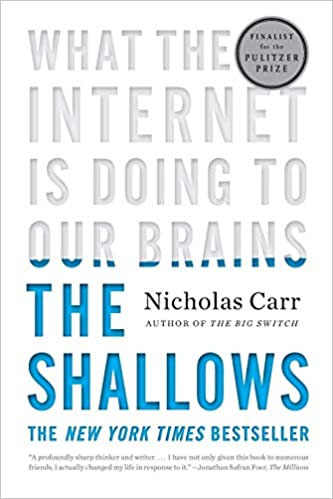"books were still around, living happily
beside newspapers. But a new threat to their existence had already
emerged: Thomas Edison's phonograph. It seemed obvious, at least
to the intelligentsia, that people would soon be listening to literature
rather than reading it. In an 1889 essay in the Atlantic Monthly,
Philip Hubert predicted that "many books and stories may not
see the light of print at all; they will go into the hands of their
readers, or hearers rather, as phonograms." The phonograph,
which at the time could record sounds as well as play them, also
"promises to far outstrip the typewriter" as a tool for
composing prose, he wrote. That same year, the futurist Edward Bellamy
suggested, in a Harper's article, that people would come
to read "with the eyes shut." They would carry around
a tiny audio player, called an "indispensable," which
would contain all their books, newspapers, and magazines. Mothers,
wrote Bellamy, would no longer have "to make themselves hoarse
telling the children stories on rainy days to keep them out of mischief."
The kids would all have their own indispensables.
Five years later, Scribner's Magazine
delivered the seeming coup de grâce to the codex, publishing
an article titled "The End of Books" by Octave Uzanne,
an eminent French author and publisher. "What is my view of
the destiny of books, my dear friends?" he wrote. "I do
not believe (and the progress of electricity and modern mechanism
forbids me to believe) that Gutenberg's invention can do otherwise
than sooner or later fall into desuetude as a means of current interpretation
of our mental products." Printing, a "somewhat antiquated
process" that for centuries "has reigned despotically
over the mind of man," would be replaced by "phonography,"
and libraries would be turned into "phonographotecks."
We would see a return of "the art of utterance," as narrators
took the place of writers. "The ladies," Uzanne concluded,
"will no longer say in speaking of a successful author, 'What
a charming writer!' All shuddering with emotion, they will sigh,
"Ah, how this "teller's" voice thrills you, charms
you, moves you."
The book survived the phonograph as it had the
newspaper. Listening didn't replace reading. Edison's invention
came to be used mainly for playing music rather than declaiming
poetry and prose. During the twentieth century, book reading would
withstand a fresh onslaught of seemingly mortal threats: moviegoing,
radio listening, TV viewing...While physical books may be on the
road to obsolescence, the road will almost certainly be a long and
winding one. Yet the continued existence of the codex, though it
may provide some cheer to bibliophiles, doesn't change the fact
that books and book reading, at least as we've defined those things
in the past, are in their cultural twilight.
The Shallows, pp109-110
